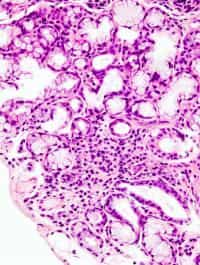Sjogren's Syndrome is a rare autoimmune disease, which predominantly affects women, with a ratio of 9:1, with a probably genetic origin due to a specific mutation but also due to EBV viral infection ( Epstein's virus -Barr ).
As an autoimmune disease, the syndrome determines the inability of T lymphocytes to discriminate between foreign organisms and autologous molecules (of the organism itself), therefore the main target becomes the cells of one's own body. In particular, the exocrine glands, in particular the lacrimal and salivary glands, are subject to the autoimmune attack, with the consequence of dryness of the lacrimal ducts, dry mouth ( xerostomia ) and keratoconjunctivitis sicca .
Sometimes other organs can also be involved as the auto-antibodies involved against the body's cells are numerous, such as anti-SSa and anti-SSB and Rheumatoid Factor FR . The symptoms of dryness can be widespread in various areas of the body, from the skin to the throat, from the vagina to the brain to the blood vessels, greatly compromising the quality of life of the subjects. The most severe symptoms affect the joints, causing muscle and joint pain.
It is often difficult to diagnose Sjogren's Syndrome immediately, as due to its symptoms it can be confused with other pathologies, only after biohumoral investigations and the evaluation of salivary and tear secretions, can one think that it is the aforementioned syndrome.
In many cases these are less serious forms, which only affect the lacrimal and salivary glands, without the appearance of other autoimmune diseases, in this case we speak of primary forms , while we speak of secondary forms (about 50% of cases) when the pathology affects the connective tissue, resulting in diseases such as ulcerative colitis, mixed connective tissue disease, scleroderma, rheumatoid arthritis, lupus erythematosus .
SS is an autoimmune disease, but genetic, hormonal, immunological factors contribute to its appearance, which do not necessarily make the pathology hereditary.
You may also like
Business Phone Subscriptions: Guide to Costs, Options and Benefits
Choosing a business phone subscription can be a complex task, with numerous factors such as costs, benefits, and options to consider. This article explores various business phone subscriptions, examining the best deals and geographic cost variations to help businesses make informed decisions.
Private Mobile Phone Subscriptions: Finding the Best Fit for Your Needs
Selecting a mobile phone subscription can be daunting with myriad plans and hidden costs. This article explores various phone plans for private use, comparing prices and highlighting key considerations to help you choose the best mobile service provider.
Green Energy and Charging Stations: Proposals and Costs
As the world shifts towards greener energy sources, the demand for electric vehicle (EV) charging stations is on the rise. This article examines the current landscape of EV charging infrastructure, comparing proposals, costs, and benefits. We delve into geographic cost variations and spotlight the most competitive charging station offers.
Analysis of Green Energy Through Photovoltaic Panels
As the world searches for sustainable solutions to combat climate change, solar energy emerges as a frontrunner. This article explores the various proposals, costs, and advantages associated with photovoltaic panels, providing a comprehensive guide to understanding and investing in solar power. It also delves into geographical cost variations and compares current market offerings for optimal decision-making.
